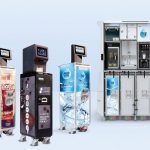 2.2 tons of CO2 emissions can be saved per beverage cup served on board an aircraft – a significant improvement in the environmental balance without having to make any technical changes to the aircraft itself. This could save the aviation industry 64 million metric tons of CO2 per year – a 70 percent reduction compared to the current system.
2.2 tons of CO2 emissions can be saved per beverage cup served on board an aircraft – a significant improvement in the environmental balance without having to make any technical changes to the aircraft itself. This could save the aviation industry 64 million metric tons of CO2 per year – a 70 percent reduction compared to the current system.
This is a result derived from a scientific study conducted by the UNESCO Chair in Life Cycle and Climate Change (ESCI-UPF) to assess Skytender Solutions’ technology. While drinks have so far been served on board from beverage cans, tetrapaks and coffee pots, Skytender is relying on its own development: a standard aircraft trolley with a built-in beverage dispenser, optionally for hot or cold drinks. The preliminary results of the study demonstrate the environmental benefits of the technology. The Skytender system has been developed in Germany. The waste problem caused by the current beverage catering alone is immense: According to the International Air Transport Association (IATA), 12.2 million metric tons of waste are produced in aircraft cabins each year, 60 percent of which is plastic waste.
Save 95 percent plastic and 45.5 million euros
“The current system with cans, bottles and juice bags is completely outdated, not only technologically but also economically. Derived from the research project conducted by the UNESCO Chair in Life Cycle and Climate Change (ESCI-UPF), our system saves up to 95 percent plastic waste, and even more valuable: CO2 emissions drop by an average of 70 percent due to other supply chains, easier transport and many other adjusting screws. What’s more, airlines save enormous amounts of money thanks to our technology platform,” says Dr. Thomas Mützel-von Schwartz, Skytender’s Chief Technical Officer. With several years of development lead, Skytender is a leader in this technology field. The approval procedures for SkyBarista, the solution for hot beverages, have already been completed – the flying barista with cappuccino, latte macchiato and other specialties is ready-to-fly already. The model is also ideal for in-flight upselling: passengers are happy to pay for a high-quality coffee specialty on board. The solution for cold drinks will soon be ready for series production and approval, and both solutions will go on test flights with leading European airlines this fall. And the calculations of the customer airlines alone are impressive: a major airline with a fleet of 150 aircrafts recoups its investment in the Skytender trolleys after just 22 months of operation. Over a period of eight years, the airline expects to save 45.5 million euros.
According to UNESCO Chair in Life Cycle and Climate Change (ESCI-UPF) results, this should be the new standard
Based on the research report, the UNESCO Chair gives Skytender’s solution an excellent report and a valuable recommendation: “The main conclusion of this report is that a change from the current system to the solution offered by Skytender is recommended in all cases studied.”
The preliminary results of the study were presented a few days ago at the World Travel Catering & Onboard Services EXPO in Hamburg, Germany, by Dr. Alba Bala, Head of Research Line of the UNESCO Chair in Lifecycle and Climate Change. The final results will be given after the study is reviewed by an independent external panel. In addition to saving the environment and the budget, cabin crews are also enthusiastic about the new solution platform: on trial flights, the system fits smoothly into the workflow and enables speedy in-flight catering. For further calculation and scheduling, Skytender’s devices are fully digital and enable precise evaluation of the drinks actually served, thus determining the demand for all flight routes.
Skytender (https://skytendersolutions.














